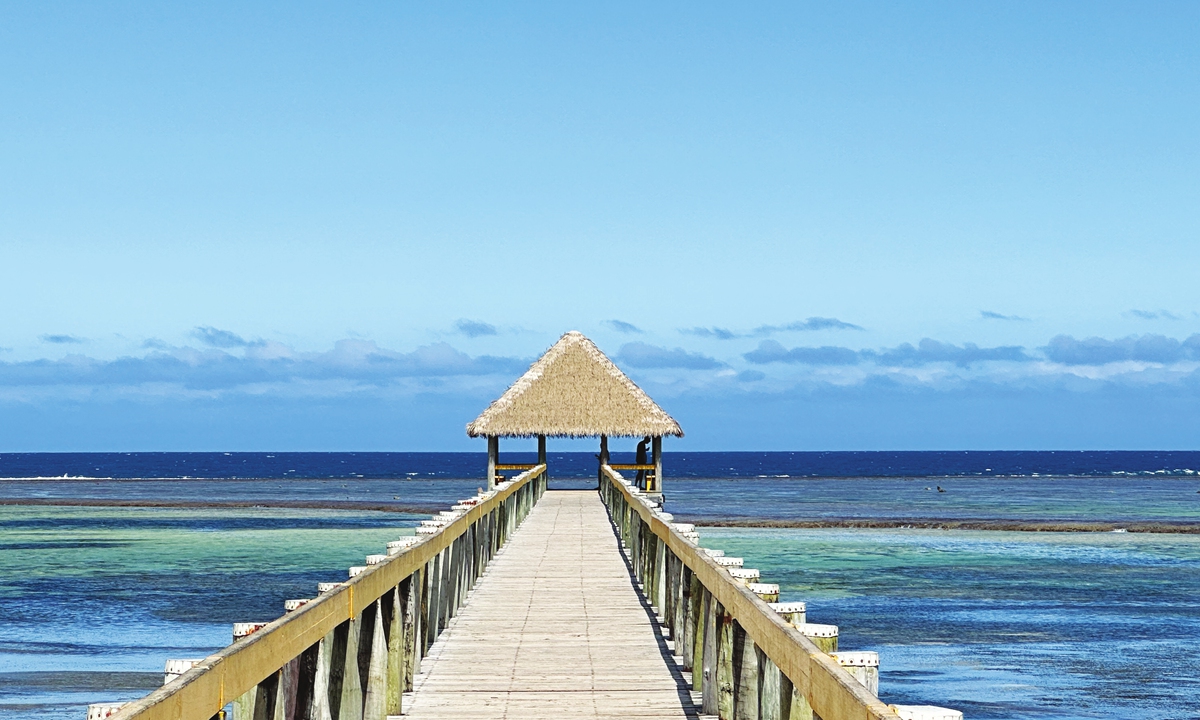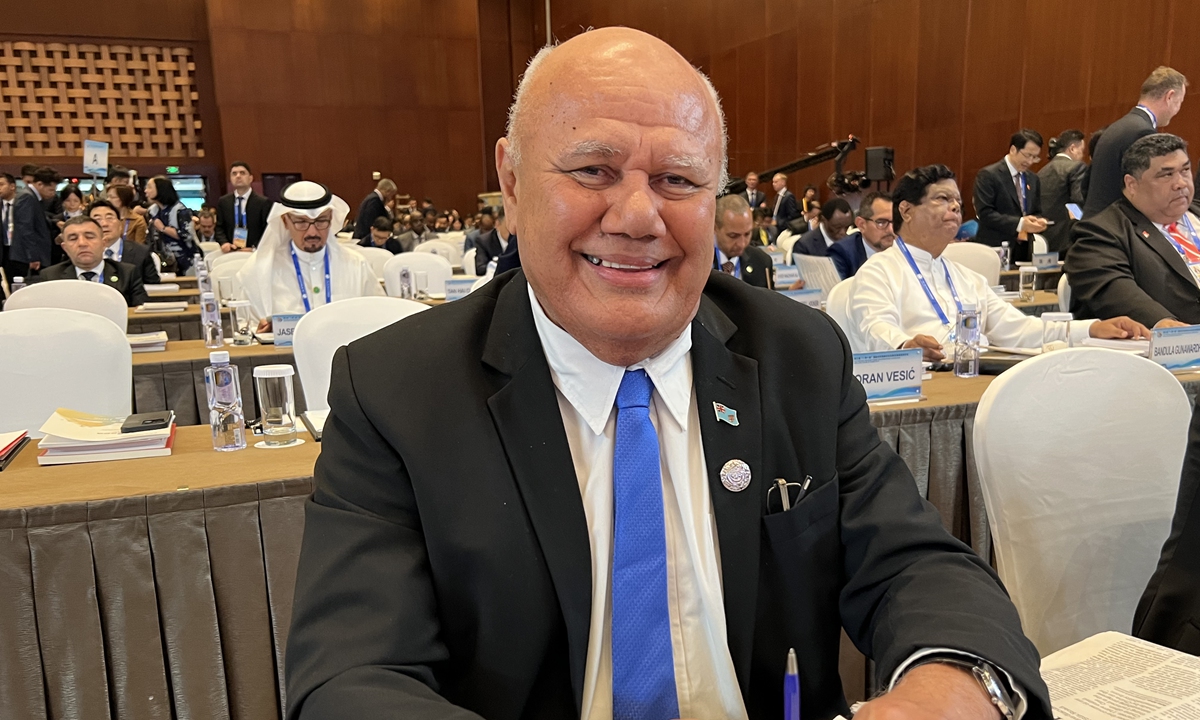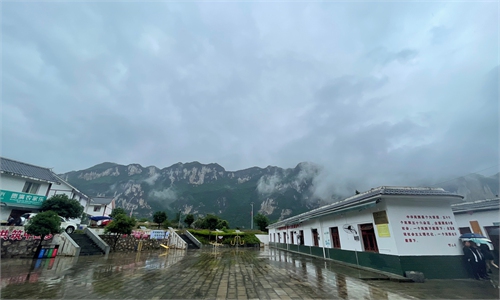
A beach scene in Fiji Photo: Shen Weiduo/GT
The relations between China and Fiji are "solid and inclusive," and the two countries are "relating to each other as families," Fiji's Deputy Prime Minister and Minister for Tourism and Civil Aviation Viliame R. Gavoka told the Global Times in a recent exclusive interview. He also expected the two countries to "build on" the fruitful cooperation results under the Belt and Road Initiative (BRI), especially in green development and tourism.
The comments were made on the sidelines of the third Belt and Road Forum for International Cooperation (BRF), which was concluded last week with a total of 369 practical collaboration projects being inked, a record high. Pragmatic cooperation between China and the Pacific Islands Countries (PICs) has also deepened, with a number of deals signed involving the promotion of Juncao technology, the facilitation of free trade agreement and the joint construction of low carbon demonstration zone for South-South Cooperation.
This year marks the 10th anniversary of the BRI. Fiji is one of the first countries in the South Pacific region to ink with China a memorandum of understanding on cooperation under the BRI framework. It is also the first PIC to establish diplomatic relations with the People's Republic of China.
Fiji wants to be an active participant of the BRI, to "grow our society and develop our country," noted Gavoka.
Deepening economic ties
In Fiji, the BRI has helped boost tourism from China. Tourism accounts for around 40 percent of Fiji's GDP, according to Gavoka. Fiji was listed among the first 20 countries and regions that China resumed outbound group tour services in February 2023.
There are also a number of Chinese companies in the country that "are doing very important infrastructure work" in areas such as airports and roads, Gavoka said, as well as other areas that are helping the development of Fiji. China is one of the major sources of foreign investment in Fiji.
"The Chinese community has been in Fiji longer than any other foreign communities, and we will develop together," Gavoka said, noting that there are a lot of areas of common interest between China and Fiji in economic and social aspects.
When asked about whether geopolitical factors could influence bilateral ties, Gavoka said that the two countries would "focus on what we can do as friends."

Fiji's Deputy Prime Minister and Minister for Tourism and Civil Aviation Viliame R. Gavoka Photo: Li Xuanmin/GT
In 2022, the trade volume between China and Fiji jumped 21 percent year-on-year to reach $546 million, making Fiji China's second-largest trading partner in the South Pacific region. In March 2023, the China-Pacific Island Countries Juncao Technology Demonstration Center was unveiled in Fiji, marking a new step forward in the BRI cooperation between China and the PICs.
"We need to build on that [the joint initiative]," Gavoka said. He met a lot of people during the BRF, which was held from October 17 to 18, to seek potential business opportunities, and he is very confident "in the cooperation [between China and Fiji] that can be developed" in the future.
On Wednesday, China announced eight major steps to support the high-quality BRI cooperation, charting out a new course in the new stage of development. Gavoka said there are several focal points in terms of cooperation between China and Fiji, and he expects that the Chinese contribution to Fiji's development will become more significant.
"One key focus is the green society we're building. The environment is very important to us, because our tourism is based on the environment in a pristine, beautiful island. And we need to protect that. I'm looking to Chinese companies to help us with that," Gavoka said.
He also noted that as the country is located in the Pacific, it is very vulnerable to climate change. "So the more we endeavor to go green and save the planet, the better it is for the countries in the Pacific."
Vast room for cooperation
Chen Canyan, president of China Agricultural & Trade Development of Fiji, told the Global Times on Sunday that as the BRI development gains traction in the PICs in the past decade, more Chinese companies have shown interest in investing in the areas such as tourism, property, and resorts in Fiji.
There're vast rooms for future cooperation between China and Fiji, according to Chen. "Fiji has rich and fertile lands, as well as favorable climate conditions for the plantation of tropical crops, and the Fiji government holds a very welcoming attitude in boosting Chinese investment in local agricultural area," Chen said.
He also mentioned that the two countries could cooperate more on fishing, inshore cultivation and maritime resource development.
"We believe more seafood from Fiji could be sold into the Chinese market after a direct logistics channel between the two countries is established," Chen noted.
At the just-concluded BRF, China reached a number of pragmatic cooperation projects with Fiji, as well as other PICs. According to a list released by the BRF last week, China will continue promoting and cooperating the Juncao technology with countries including Fiji and Papua New Guinea.
"The development blueprint is very consequential for the economies in the Pacific Islands. People in those countries are in dire need of greener economy, which will help them tackle potential sea level rise," Yu Lei, chief research fellow at the Research Center for Pacific Island Countries at Liaocheng University in East China's Shandong Province, told the Global Times on Sunday.
Yu said that a more connected region, facilitated by the implementation of the BRI, is also conducive to improving local employment and reducing poverty.
Regardless of how certain countries vilify the BRI, observers said that the economic relations between China and the PICs will move forward steadily, "to the benefits and mutual win of both sides."



